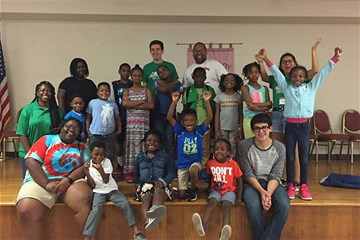As Wesley Theological Seminary Alumni Pastor Paul Johnson ('09) enters his final year as a Doctor of Ministry student in the Public Engagement track, he looked back to the first, inspiring event of his coursework.
"Our very first class was in Charleston, South Carolina, where we visited Mother Emmanuel AME Church, where Clementa Pinckney pastored," he said.
Being at the site of the tragic shooting that took Pinckney's life proved a profound beginning. "We came to understand not only Pastor Pinckney's ministry but how necessary it is to fight the very real principalities that exist in this day and age," Johnson said.
A Black Lives Matter parade passed the church as he exited with his Public Engagement cohort. "We were all struck by the irony," Johnson said. "Especially since it's our desire to better engage the Church with matters of justice that are relevant in the public square."
The group studied the history of the city, and the role that racism continues to play. "That set the tone to examine how racism plays out in our various different contexts," Johnson said, referring to the diverse perspectives of his fellow students.
As a Wesley alumnus and lead pastor at Hughes Memorial United Methodist Church in Washington, D.C., Johnson is deeply aware of the responsibility that comes with his position, and he relishes the opportunity to bring elements of public theology to his work.
"Every week we're given a forum to proclaim the word of God," he said. "Public theology brings justice and mercy together in the pulpit. It also energizes people to go out and do the work. Justice and mercy become a reality in the streets as well as in the sanctuary."
Johnson received his Master of Divinity in 2009 and expected to pursue his doctoral studies in a different setting. Those plans changed with news of the new Doctor of Ministry opportunity. "When this Public Engagement track was introduced at Wesley, I just thought 'Oh, wow,'" he said.
With his coursework complete, Johnson is hard at work on his thesis project: "Strategic Partnerships as a Model for Developing Effective After School Programs in Urban Settings."
"The hope of this project is to develop partnerships that serve the whole needs of our youth," he said. "That means their emotional needs, their academic needs, and their insecurity around food and housing."
Under Johnson's leadership, Hughes Memorial has already put a related outreach opportunity into action, partnering with Project Transformation Washington, D.C. on a summer literacy program.
"If we can get our kids reading on grade level or above, it dramatically decreases their chances of getting caught up in the school-to-prison pipeline," Johnson said.
There is no question that his passions have been fed – and enlarged – by his work in the Public Engagement cohort.
"It's exactly what I was looking for," he said. "The program seeks to give a voice to those who are pushed to the margins and that's what my ministry is about — to bless people who are not deemed of value by society."
United Theological Seminary website, Dayton, Ohio
One of seven apportioned giving opportunities of The United Methodist Church, the Ministerial Education Fund is at the heart of preparing people for making disciples of Jesus Christ for the transformation of the world. The 13 United Methodist seminaries help students to discover their calling through the challenging curriculum. The fund enables the church to increase financial support for recruiting and educating ordained and diaconal ministers and to equip annual conferences to meet increased demands. Please encourage your leaders and congregations to support the Ministerial Education Fund apportionment at 100 percent.





